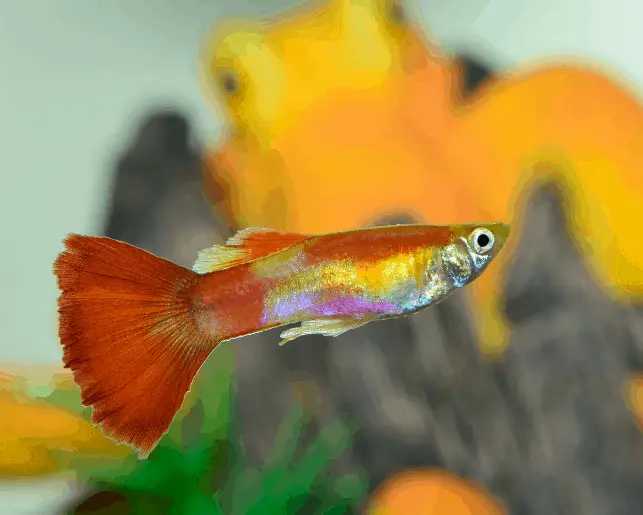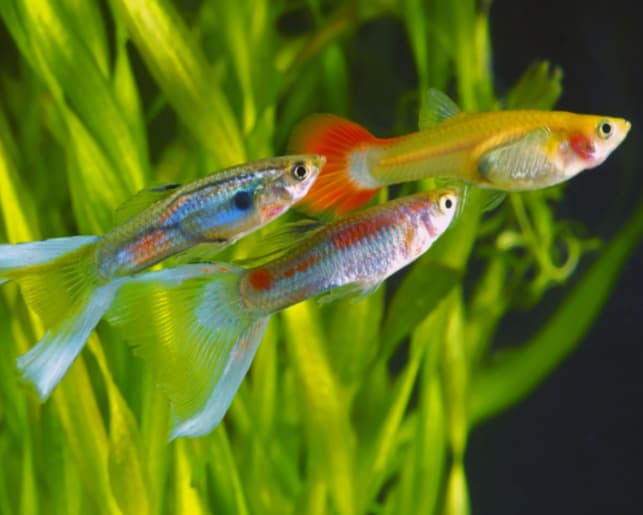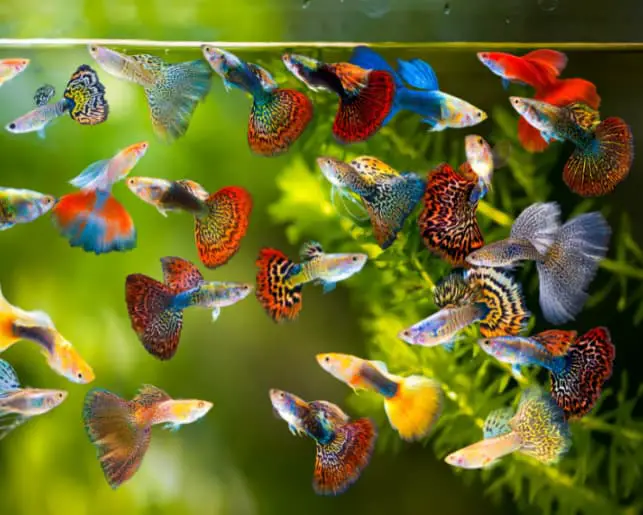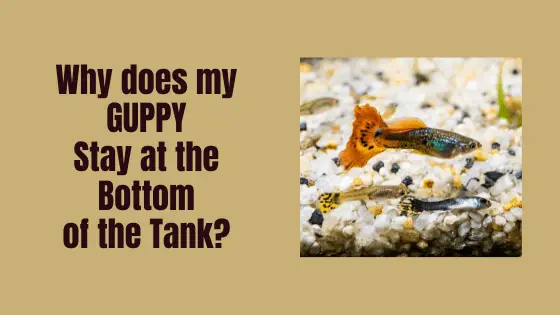Guppies are often a first choice for new aquarium lovers, favoured for their bright colours, friendly temperament, and general hardiness. They’re excellent options for beginners and experts alike, but, regardless of your experience, it’s important to understand their behaviour to give them the best possible care. If your guppies are suddenly spending a lot of time at the bottom of the tank, this could signify something that needs your attention.
Guppy fish can stay at the bottom of the tank due to swim bladder infections, ich, or pregnancy. This behaviour can also signify that your tank isn’t the best environment for your fish. Staying near the bottom of the tank may be a sign that you need to perform a water change or adjust the temperature.
The rest of this article will tell you everything you need to know about bottom-dwelling guppies, so you can better understand what this behaviour means and how to address the different problems it can signify. Read on to learn more.

Why Is My Guppy Fish Lying at the Bottom of the Tank?
Here are some reasons why your guppy might be lying at the bottom of the tank:
- Your fish has a swim bladder infection. Fish have an organ called a swim bladder that controls their buoyancy and ability to swim properly. Unfortunately, swim bladder infections are common. If your fish is swimming strangely, upside down, or unable to swim to the top of the tank, they might be suffering from an infection.
- Your guppy is suffering from ich or another illness. If your guppy is frequenting the lower section of its tank, this can mean that your fish is sick and needs treatment as soon as possible.
- The tank needs to be cleaned. A dirty tank can make your fish sick. This is why it’s important to make frequent water changes.
- Temperature adjustments may need to be made. If your fish is too hot or too cold, it might spend less time being active and more time near the bottom.
- An aggressive tank-mate has injured your fish. An injured fish might not be able to swim regularly.
- Your guppy is being picked on by another fish in the tank. If you fish is being targeted by another fish, they will get stressed and will try and find somewhere quiet in the tank to hide away.
- Your guppy is pregnant. Guppies often spend time near the bottom of the tank if they’re pregnant. If you’re concerned that this is the case, the following section covers common guppy pregnancy signs to look out for.
Do Pregnant Guppies Stay at the Bottom of the Tank?
Pregnant guppies do sometimes stay at the bottom of the tank. If your guppy is spending a lot of time laying at the bottom of the tank or swimming very close to the substrate, this can signify pregnancy. However, you should also check for other pregnancy signs to rule out illness.
But how exactly can you tell if your guppy is pregnant or not?
How To Tell if Your Guppy Is Pregnant.
If you think that your guppy may be pregnant, here are some common pregnancy signs you should look out for:
- Your guppy is spending lots of time near the bottom of the tank. Not every guppy is the same, but many display this behaviour during pregnancy. Your fish might simply be exhausted from pregnancy’s toll on her body.
- Your guppy is visibly more prominent than normal. Obesity in fish isn’t exactly a common thing. If you notice that your guppy’s stomach appears to be bigger than usual, this can be a sign that your molly is carrying babies.
- Pregnant guppies may hide more. If you have good hiding places in your tank (as you should), a pregnant guppy will usually want to keep a distance between herself and the other fish around her. While most guppies will hide with or without babies inside them, more hiding than usual can be a common sign of fish pregnancy.
- Your guppy is female. I know this sounds a bit stupid, you need to know whether or not your fish is female before making any judgments about pregnancy. This is crucial because if your guppy is a male, it’s likely that your fish is ill rather than pregnant. This can also signify the need for water adjustments.
If you learn better with visuals, this YouTube video by Albert does an excellent job of explaining how to tell if your guppy is pregnant or not.
Are Guppy Fish Bottom Dwellers?
Guppy fish aren’t bottom dwellers. While they’re known to have the occasional algae snack, they’re not naturally bottom feeders and should be swimming around the entirety of the tank. Bottom-dwelling fish include loaches, corydoras, plecos (plecostomus), and others.
If your guppy is spending a lot of time at the bottom of the tank, this is considered abnormal behaviour. I have 5 guppies and I very rarely see them at the bottom of the tank. They spent most of their time whizzing around the middle and top of it.

Signs of Illness To Look Out For.
Unfortunately, a bottom-dwelling guppy might be a sick, or even dying guppy.
As discussed earlier, guppies aren’t natural bottom-dwellers like loaches and other common bottom-feeder species. If you’re convinced that your fish isn’t pregnant, it’s essential to check for symptoms of common fish illnesses.
Here are some illnesses and ailments you should check for:
- Ich: Ich is one of the most common illnesses seen in freshwater fish. It’s a parasitic infection that causes white spots to appear on your fish.
- Swim bladder infections: An infected swim bladder can affect your pet’s ability to swim properly.
- Fin rot: Fin rot is relatively easy to diagnose. While this is more common in bettas and other fish with more elegant tails, guppies can still be prone to this.
- Poisoning (contaminated water): Unfortunately, it’s all too easy to contaminate the water in your fish tank accidentally. If you use harsh soaps to clean your fish care supplies, the chemicals in the soap can transfer over to your tank. You should also have a designated bucket for water changes to protect your fish from cleaning solutions.
- Chlorine sickness: It’s imperative to ensure that the water in your fish tank is dechlorinated. If you forget this step during cleaning and/or water changes, this can make your fish very sick.
In addition to bottom-dwelling behaviour, here are some signs of illness that you should look out for:
- White spots (ich)
- Slowed movements
- Rotted fins
- Your fish isn’t eating
- Increased or decreased aggression (depending on the typical behaviour of the individual fish)
How To Treat Common Guppy Illnesses.
If you think your fish is suffering from an illness, it’s crucial to treat your tank properly.
it’s crucial to treat your tank properly. One helpful solution is to carry out a partial water change. I would also test the water. I personally would carry out the water change even if the water parameters are showing as fine.
It is also a good idea to have a quarantine tank in case you need to take a sick fish away from the group. I have written a helpful article on quarantine fish tanks which you can read here.
Do Guppies Like To Hide?
Guppies like to hide, like most fish. Hiding places allow your guppy to feel safe while getting accustomed to a new tank. They can also serve as shelter, just in case some of the other tank members show aggression.
If your fish stays close to the bottom to hide, this is probably nothing to worry about. It’s still a good idea to double-check for symptoms of pregnancy and illness for safety.

Final Thoughts.
Guppies are always a brilliant addition to any community tank because they’re relatively easy to care for. However, no fish is immune to ailments. If your guppy is spending a lot of time near the substrate, this can mean illness, pregnancy, or an inadequate environment.
Hopefully, this article has helped you better understand your guppies, so you can analyse their behaviour and continue to keep your fish as happy and healthy as possible.

